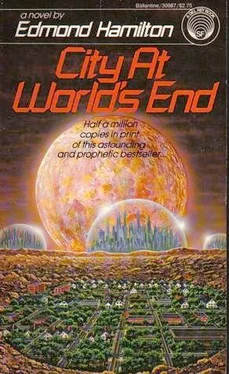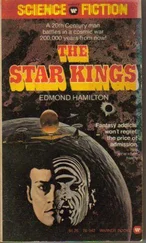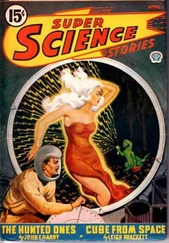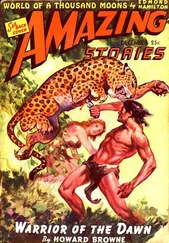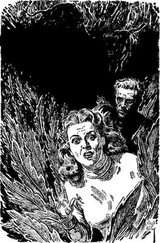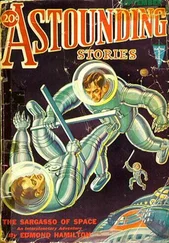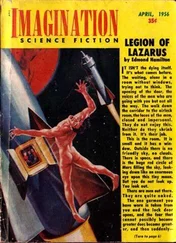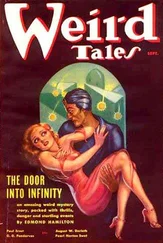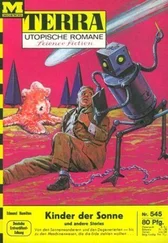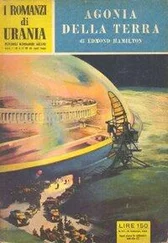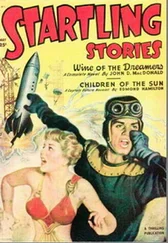The head of the caravan reached a section that was barred off with ropes. The ropes were laid aside, and the cars went in.
Hubble’s advance squad was ready. Without them the assignment of nearly seventeen thousand people to improvised quarters would have been impossible. With them, it was a scrambling chaos, carried out strangely without much noise. Men and women moved with a sort of stunned docility, glancing sidelong into the dust and the shadows, peering at the blank windows and the tall strange rooms, afraid to raise their voices. Gradually the sound of motors died, and the streets were ghastly in their silence, and it was a silence so great that the scuffling of many feet and the murmur of many voices and the labor of unpacking trucks and cars did not disturb it, but were merely lost. Even the dogs were cowed.
Kenniston made his report to Hubble and then went in search of Carol.
Here and there people still sat in their cars, refusing to move from their one last familiar reality, and he passed a woman who crouched in the dust of the street and wept, with her arms full of blankets. Something of the same feeling of despair infected Kenniston. It was not going to work, it was not going to work at all, and he dreaded to talk to Carol. But he plodded on until he found her.
There was a great vaulted room on the street level, smelling dismally of the dust and desertion of ages. Very tall windows let in what light they could, but still it was dusky. There were twenty women in the room, of all sorts and ages, milling about with suitcases and loads of bedding, uttering vague wails and words of complaint, struggling with rolled-up-mattresses. Carol and her aunt were two of the twenty.
Characteristically, they had managed to get off in a corner as much by themselves as possible. Mrs. Adams had collapsed onto her improvised bed, and Carol was making what order she could of their scanty belongings.
“Are you all right?” he asked her anxiously, and she nodded. From the nested blankets on the floor Mrs. Adams whimpered, “Why did they bring us here, to this dreadful place? Why couldn’t they have let us stay at home?” Carol hushed her as she would a fretful child.
Two sniffling, mouse-faced girls had crept up to ask Kenniston questions. Behind them a short, thick, middle-aged woman was stamping up and down along the walls, banging open the doors that pierced them.
“Where’s the bathrooms?” she was demanding belligerently.
Kenniston took Carol to the doorway and a little beyond it, where if there was no more privacy they were at least not beseiged. He said, “I know it’s rough as hell now, but it’s only for a little while—this bunking together, I mean. There’s room enough for everybody here, and you can pick out a place you like, all to yourselves. I can fetch anything you want from your house, your books and things, even furniture…”
She cut him short. “No! I don’t want anything touched there. I want to know it’s all just as I left it, so I can at least think about it, and maybe…”
She shook her head, and then went on, “Ken, old Mr. Peters from our street had another stroke when we got here. They took him away on a stretcher. He was dying, and I saw his face. He was looking up at these awful buildings, so puzzled and afraid. He was trying to understand, and he couldn’t.” She shivered.
“Dying isn’t good anywhere you do it,” he said. “But we’re young and strong and we aren’t going to die.” He added, before he left her, “There was a baby born on the march. Think of the baby, Carol, instead of the old man.”
He went away, depressed and worried. Carol seemed different, and he didn’t think it was just her tiredness. Perhaps she had roots too deep, not just in Middletown but in the pattern, the state of mind. Well, the pattern was smashed forever now, and she, and all of them, had to adjust.
Kenniston had gone two of the long squares, sunk in his disturbed thoughts, before he realized that a change had come into the streets. He tried to think what it was. People were more in the buildings now, and less in the cars, but that was not all of it. There was something…
The streets had suddenly come alive.
The children had done it. Overawed at first by the strangeness and the silence and the behavior of their elders, it had slowly dawned upon them that here was a whole great city lying ready to their hands—fabulous empty buildings full of mysteries and treasures, new streets, new narrow ways behind them, all virgin territory to be explored. By twos and threes the venturesome spirits had started out and taken others with them. And now the lofty hallways rang with shouts and running feet, small figures scudded to and fro across the pavement, the shadows teemed with motion, with screams and squeals and the voices of parental anger. One bull-lunged urchin had discovered that he could make echoes. Another, intoxicated by blank expanses of white, unsullied wall, stood with a stub of pencil in his hand writing in ever-enlarging letters. Kenniston thought, The irreverent little bastards! But his step quickened, and quite suddenly, he felt that it was going to work out after all. The human race was tough.
He had further evidence of that in the next two days. The great waves of the migration poured down across the dusty ridge and in through the portal, the clamorous thousands of wheels and motors, the countless faces and peering eyes. And for those who came on the second day and on the third, it was not so bad as it had been for those who came first.
The seventeen thousand pioneers had lifted the curse of the empty stillness. Community kitchens, working on oil and gasoline ranges, filled the air with the homely, cheering smell of coffee. There was hot food, and the excitement of searching out friends and comparing notes. Indefatigable housewives busied themselves with brooms and drove their husbands to cleaning windows and whacked their unruly children. And the cars piled up in lines along the streets and boulevards, the Plymouths and Nashes and Chevrolets and Fords, incongruous in this dreamlike city of an elder Earth.
On the third day they brought the sick and put them in the hospital.
They brought the prisoners from the jail and locked them away in another building. A great structure on the central plaza became the City Hall.
And by that third night, not a soul was left in Middletown. All were here under the great dome of the alien city.
“We’ll call this place New Middletown,” Mayor Garris had proclaimed.
“Makes it seem more like home.”
Kenniston walked with Carol that night down one of the dark main avenues of the domed city. There was candlelight and lamplight from doorways and tall windows. A baby wailed from inside a dark doorway and was hastily soothed. Dogs barked defiance to alien ghosts. A tinny phonograph sang somewhere:
“I can’t give you anything but love, baby!”
Kenniston thought that the streets of tall white buildings looked down with their windows as with eyes—amazed, bewildered. This city beneath the shimmering starlit dome had had silence for a long, long time.
Silence, and the slow swing of the cold red Sun and the farther stars.
Could a city remember, Kenniston wondered? Did this one remember the old days of its builders, the lovers who had walked its ways and the children who had known its nooks and corners? Was it glad that men had come again, or did it regret the agelong silence and peace?
Carol shivered a little and buttoned her topcoat. “It’s getting colder.”
Kenniston nodded. “But not bitterly so—only like an October night, back in our own time. We can stand that.”
She looked up at him, her eyes dark in the white blur of her face. “But how will we live here, Ken? I mean, when the food from Middletown’s warehouses runs out?”
Читать дальше
